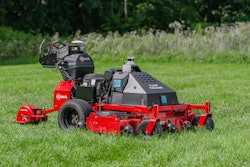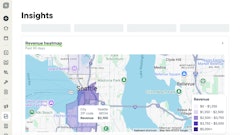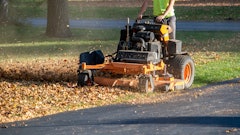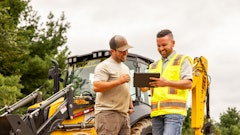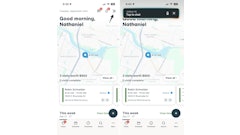
The landscaping industry is in the midst of a quiet but significant revolution. Long reliant on gas-powered tools and manual processes, the field is being reshaped by smart connected battery technology.
This shift is not just about replacing engines with batteries. It marks a broader transformation in how work gets done, how teams are managed and how businesses adapt to the increasing demand for sustainability and efficiency.
Smart technology is making it easier for landscaping teams to work smarter, not harder. Equipment now comes with real-time performance feedback, usage data, and maintenance alerts. GPS-enabled platforms let managers track machines in the field, check how they’re being use,d and monitor their condition, all without leaving the office.
This level of insight helps crews stay on task and reduces the likelihood of costly breakdowns. With maintenance needs triggered by actual usage instead of fixed schedules, teams can service equipment before problems arise. Remote diagnostics add another layer of support, helping resolve issues quickly and keeping downtime to a minimum. These improvements translate into higher productivity and better use of resources on every job.
The data collected from connected equipment helps managers understand how assets are being used, when they need attention, and how performance varies across crews or job types.
The Benefits of Battery Power
Battery-powered equipment offers a wide range of advantages that go beyond fuel replacement. It helps eliminate many of the inefficiencies that crews deal with on a daily basis. Tasks like filling gas cans, mixing fuel and conducting routine maintenance on spark plugs and belts can be time-consuming and error prone. These steps cut into the workday and increase the chances of equipment failure or human mistakes.
Swapping out a battery takes just seconds and removes the delays caused by fuel runs or engine prep. Fewer moving parts mean less routine maintenance and fewer breakdowns. That allows crews to spend more time working and less time dealing with equipment issues. The use of connected platforms also gives managers visibility into how and when tools are being used, making it easier to allocate resources and reduce waste.
Despite early skepticism in the industry, battery tools now match gas-powered equipment in performance and runtime. In fact, in many applications, they’re delivering equal or even superior power and performance compared to their gas counterparts. Crews no longer have to sacrifice power to gain the benefits of electric. Many companies that have made the switch report tens of thousands of dollars in savings annually. These savings come from reduced fuel and maintenance costs as well as less downtime and better labor efficiency.
Battery-powered tools also tend to be lighter and quieter, which improves both operator comfort and customer satisfaction. Lower noise levels reduce fatigue and make it easier to work near homes, schools, or commercial properties. In some cases, customers have assumed crews never arrived simply because they didn’t hear the equipment. That kind of quiet efficiency helps raise service standards and reduces complaints.
More about technology on GreenIndustryPros.comHow Smart Service Businesses Use Telematics Data to Build Winning Teams - This e-book explores how successful fleet-based service businesses leverage GPS and telematics data to train, oversee, and retain high-performing teams. Adding Tech to Your Lawn and Landscaping Jobs - CompanyCam has developed a mobile app that allows lawn and landscaping contractors to photo document their jobs, add those photos to their website, communicate with customers and workers and much more. Charged and Ready to Go - Take a look at what landscape professionals need to know about charging battery-powered equipment. |
Preparing for the Future
This shift isn’t about abandoning the systems that have worked in the past. It’s about giving crews the tools they need to work better.
Smart tools are changing the way landscaping businesses make decisions. The data collected from connected equipment helps managers understand how assets are being used, when they need attention, and how performance varies across crews or job types. This insight supports better planning, smarter scheduling and more informed investment decisions.
Accountability also sees meaningful gains through these systems. GPS tracking and usage logs provide clear records of when and where work was completed, which is especially helpful in residential areas where quieter electric tools may lead clients to assume a service was missed. These digital records prevent misunderstandings and make it easier to resolve questions quickly and accurately.
As digital platforms expand, automation is becoming a natural next step for landscaping operations. Autonomous mowers and connected job management tools are already helping companies reduce their reliance on manual labor and improve oversight. These systems take on routine tasks and give skilled workers more time to focus on higher-value or more complex work.
Technology will also continue to improve how businesses plan, schedule and respond to changing conditions. From predictive maintenance to energy tracking and route optimization, smart tools are making operations more flexible and resilient. Lighter batteries with faster charging and longer runtimes extend the possibilities for what a crew can accomplish in a single shift.
Lawn care professionals today face growing pressure to be more efficient, sustainable and responsive. Smart battery-powered technology offers a path to meet those challenges head-on. By reducing waste, simplifying equipment management and creating quieter job sites, connected tools are helping businesses modernize in ways that support both growth and long-term viability.
This shift isn’t about abandoning the systems that have worked in the past. It’s about giving crews the tools they need to work better, adapt faster and stay competitive in a changing market. As more companies explore the possibilities of smart tech, the landscaping industry is positioned not just to evolve but to lead the way forward.




